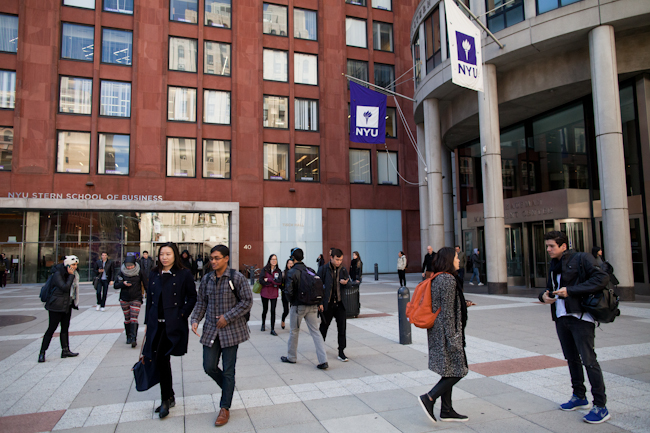
NYU Stern. Ethan Baron photo
There’s such a thing as over-affiliation, says Jonathan B. Williams, the assistant vice president for undergraduate admissions at New York University.
“Probably the most common mistake that applicants make is to try and be something that they are not in their application,” Williams says. “We are most interested in who they are and what they have to offer, not how well they can recite what they have learned from our website.”
With an acceptance rate of just 8% for students entering this past fall, the Stern School of Business at NYU is one of the most exclusive undergraduate business schools in the country. Only Cornell University’s Dyson School (2.9%), UC-Berkeley’s Haas School (4.3%), and Pennsylvania’s Wharton School (6.49%) were more selective for last year’s entering business students. For students hoping to beat the odds and gain entry into the highly selective program, Williams says the key is not only to learn what a college or university is looking for, but also how to tell their own story.
In order to build a diverse student body, NYU doesn’t seek out a certain “type” of candidate, Williams, who has been in this role at NYU for almost three years now, says. Instead, successful applicants come from all walks of life and represent “many different approaches to business.”
“What they all have in common is intellectual curiosity, lots of motivation to explore their ideas and an impactful engagement with the world around them,” Williams says.

Vice President of Undergraduate Admissions at NYU Jonathan Williams. Courtesy photo
THE HOLISTIC APPROACH TO EVALUATING APPLICANTS
Among the incoming Class of 2018, Stern students averaged an SAT score of 1,468, with international students making up an 23% of the population, which was higher than all but two of the 88 undergraduate business schools ranked this year by Poets&Quants for Undergrads. At about 30%, Stern also enrolled one of the highest rates of U.S. minority students and was much higher than any other top ten school. Stern also enrolled 14% first-generation college students.
Explaining the makeup, Williams says the admissions team uses a holistic review process, where all components of an application are reviewed to make a decision. However, the most important thing in any application, he says, regardless of which school or program at the university the student is hoping to enter, is the overall academic profile. A student’s academic profile is made up of their GPA, as well as a presentation of how the student has challenged themselves with available high school curriculum.
“Straight As doesn’t mean much if the courses taken to get those As are not challenging,” Williams explains. “At the same time, students have to demonstrate that they understand the balance between challenging coursework and their ability to do well in that coursework. Standardized tests are important as well. They help to give context to the rest of the academic information.”
NYU has 10 undergraduate schools and programs offering over 230 areas of academic study. Naturally, admission to the business school is competitive. In the past years, for example, Williams says applications to Stern have come from the most active students in their applicant pool. Not only are they academically advanced, they are often also involved in extracurricular activities ranging from art, music, and sports to clubs, community engagement, and volunteering. As many are leaders both inside and outside the classroom, Williams says applications have to be reviewed meticulously and comprehensively and “there is never one particular thing that ultimately makes the decision” on whether a student is in or out.
“The truth is,” Williams continues, “that most students that apply to our school are driven and quite talented. We simply do not have the room to accommodate all of them.”
WHAT IT’S LIKE TO START UNDERGRADUATE BUSINESS EDUCATION AT STERN
For those that are accepted and enroll at Stern, preparation work gets going early. Stern students kick off their education with a team of professional academic advisors who host a Facebook Live session as early as May. By June before entering the university, students can make use of “call-in question days.” First-year students are also invited to a Facebook group to “meet” their classmates virtually, Tiffany Boselli, assistant dean of Academic Advising & Judicial Affairs at Stern says.
“First-year students are also required to attend NYU and Stern orientations in August at which students are placed in Cohorts of 60 students, each named for an area of New York City like Chelsea, TriBeCa, or the West Village,” Boselli explains. “In their Cohorts, students go through orientation, which includes Convocation with the Dean of the Undergraduate College, academic information sessions, club fairs, and even a trip to the U.S. Open. Throughout it all, we all do our best to make the summer months before their first year positive and productive.”
ONE OF THE BIGGEST MISTAKES TO AVOID WHILE APPLYING TO NYU
One of the biggest mistakes applicants make when applying to NYU, Williams says, is not starting work on their applications early enough. The college application process is a lengthy one requiring time and energy, as students need to do research to find the school that meets their college and career goals.
Even today, Williams says that parents play a critical role in helping students navigate the complicated and possibly overwhelming process. “We often hear from parents in the early stages of the application process. For example, they often accompany their student during a visit to campus,” he says. “They sort of disappear once the application has been submitted and then resurface once the admissions decisions have been released and admitted students are trying to decide where to go.”
Where possible, Williams also says it may be a good idea for parents to begin bringing their children to visit college campuses as early as in the 9th or 10th grade to get a sense of the environment. Doing so would help students feel like they would be happy to go to any school on their college list, he says.
When asked to advise high-schoolers on how to best prepare themselves for the NYU application, Williams says students should practice introspection to know what they want from their college experience. It isn’t so much about which major they want to pursue, Williams explains, but about their academic and social likes and dislikes.
While NYU has a lot to offer students, Williams advises to remember what it is — a large research university in an urban setting that will never be a small, rural, liberal arts school.
“Students applying to NYU Stern should have a clear understanding of the school’s educational offerings, philosophy and expectations. It is never a good idea to apply to a school because you ‘heard’ that it was a good school,” Williams says. “What makes a school a good school is that it can meet that student’s needs in a way that feels very special. You can’t find that out without making the effort to understand what you want and how a particular school can help you get there.”
DON’T MISS: WHAT’S HAPPENING NOW AT NYU STERN? or THE CITIES THAT COLLEGE STUDENTS LOVE











Questions about this article? Email us or leave a comment below.